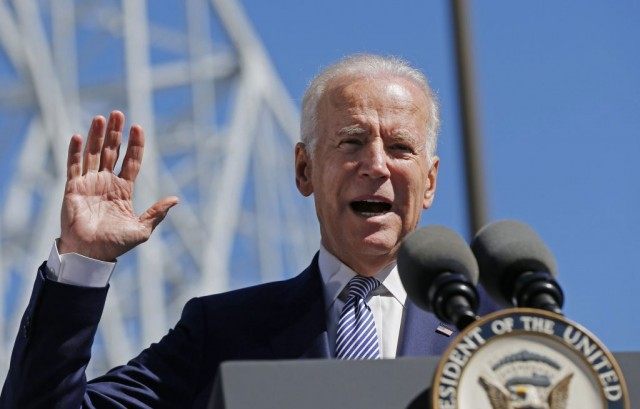In a week of big news stories, few noticed the seven-year anniversary of Obama’s $800 billion American Recovery and Reinvestment Act. Despite the bill’s reputation, on Wednesday, Vice President Joe Biden embarked on a three-city victory tour to celebrate the anniversary of the act for which he oversaw the implementation.
During his trip, Biden gushed that the stimulus was “the most ambitious energy bill in history.” Politico cites the $90 billion it “pumped into renewable power, advanced biofuels, electric vehicles and other green stuff” as helping to “triple U.S. wind capacity and increase U.S. solar capacity more than 20-fold.” Yet, probably because he, obviously, wanted to focus on the positives, Biden didn’t visit any of the “green stuff” projects.
While Biden crowed about the success of the stimulus, the Spanish company that received more than $3.67 billion of taxpayer funds—the majority (thanks to connections with high-ranking Democrats) through the 2009 stimulus bill—released its Industrial Viability Plan that laid out its plans for survival. The Financial Times reports: “The company is trying to avoid collapse as it restructures its debts and raises cash. Abengoa sought creditor protection in November, and if it were to default it would count as the largest bankruptcy in Spanish history.”
Everybody knows about Solyndra’s brief history, costing taxpayers over $500 million. But Abengoa has managed to use tricks and reported illegal practices to stay alive—until now.
Now, it appears that the second largest recipient of taxpayer dollars from Obama’s clean-energy stimulus funds is nearly bankrupt—with the U.S. government being the largest creditor. In November, after Abengoa started insolvency proceedings, the Washington Times wrote: “Abengoa is a Spanish company that was another of President Obama’s personally picked green energy projects, and it’s now on the verge of bankruptcy, too, potentially saddling taxpayers with a multi-billion-dollar tab and fueling the notion that the administration repeatedly gambles on losers in the energy sector.”
Abengoa could be bankrupt by this time next month, as Spanish law gives it four months from the initial filing to try to restructure its debt. Last week, ratings agency Moody’s declared that Abengoa’s underlying operating business is still “viable.” Yet, according to the Financial Times, Moody’s is “maintaining a negative outlook…given that discussions on debt restructuring might not be successful and the company might end up in a formal insolvency process.”
While “discussions” are going on in Spain, the trouble continues here in the U.S.
In December, citing “financial difficulties,” Abengoa shut down seven bioenergy plants—including its Hugoton, KS, cellulosic ethanol plant after it sold, according to Biomass Magazine, just one railcar of product. Watchdog reports that the Hugoton plant received a $132.4 million loan guarantee and a $97 million grant. The cellulosic ethanol plant—which was designed to produce fuel from leftover, post-harvest, crops—opened just a little more than a year ago with dignitaries such as U.S. Energy Secretary Ernest Moniz, former Energy Secretary Bill Richardson, and former Interior Secretary Ken Salazar participating in the “Ceremonial start-up.” The Garden City Telegram states: “Despite the initial fanfare, the plant never lived up to its billing.”
And there’s more. On February 10, the California Energy Commission finally rejected a new plan for the Palen solar farm Abengoa had been developing. The Desert Sun, which has been following developments with the project, reports: The company missed a construction deadline “after entering into pre-bankruptcy proceedings in November.”
Then, on the very day Biden was touting stimulus successes, a group of grain sellers, who had not been paid by Abengoa Bioenergy, filed an involuntary Chapter 7 bankruptcy petition in Kansas. American companies that haven’t been paid for deliveries, dating back to early August, are owed more than $10 million. They hoped the suit will require U.S. creditors be paid before funds from any asset sales are retained by the parent company in Spain—which was just granted by the court.
Abengoa has also been sued by shareholders, who say that the company misled them about its financial plans. Stock prices have been declining throughout late 2015 and plunged after the November bankruptcy announcement. After a 2014 high of $28, the company’s stock is currently trading at $.81.
In Spain, former Abengoa executives have been accused of insider trading and mismanagement. Their assets have been frozen and seized. On February 17, former chairman Felipe Benjumea’s passport was revoked to prevent him from leaving the country.
With Abengoa in the news while Biden was on his victory tour, it is clear why he chose to avoid the “green” disasters created by, as he called it, “the most ambitious energy bill in history.”
While Biden isn’t currently on any ballot, Senator Bernie Sanders and Secretary Hillary Clinton are. Both will double down on Obama’s green energy policies like those that created the embarrassing Abenoga debacle—and many others.
Addressing Abengoa, Biomass Magazine’s senior editor Anna Simet, said: “People have a problem when government money is given to projects like these, and they experience failure. We all know that.”
Ya think?
The author of Energy Freedom, Marita Noon serves as the executive director for Energy Makes America Great Inc., and the companion educational organization, the Citizens’ Alliance for Responsible Energy (CARE). She hosts a weekly radio program: America’s Voice for Energy—which expands on the content of her weekly column. Follow her @EnergyRabbit.

COMMENTS
Please let us know if you're having issues with commenting.